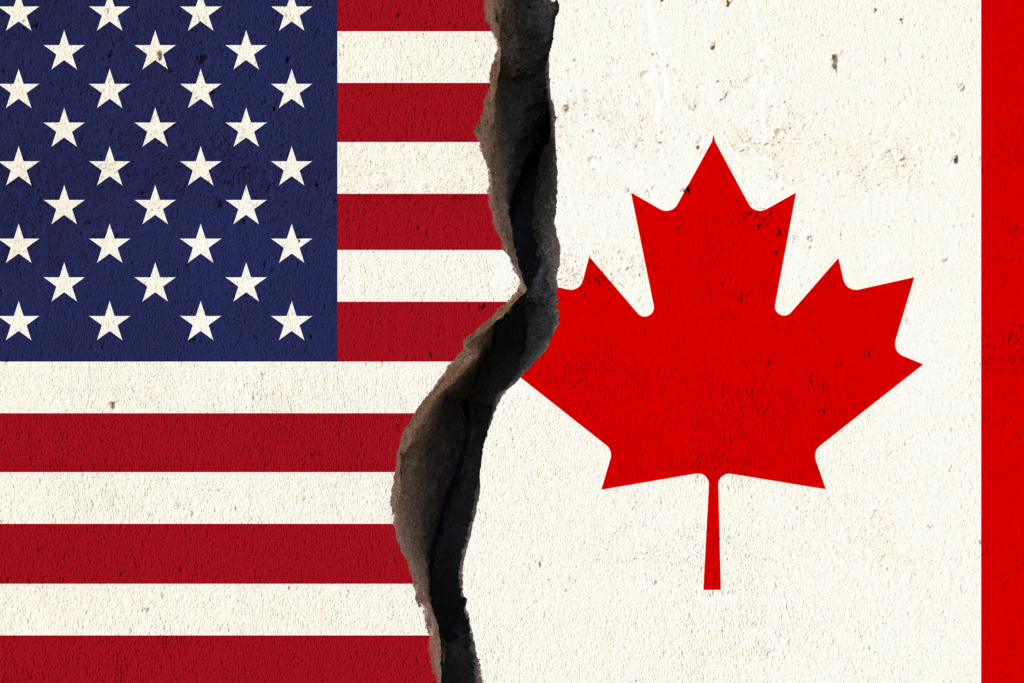My mother was in her early 90s when she passed away in early 2016. She was often fascinated by US politics. She bought our first colour TV in 1973 because she wanted to watch the Watergate hearings in colour, which to me seemed pointless since it was mostly just old men in a room talking. Her fascination with politics got me interested in the topic from an early age, and I eventually spent a lot of my own time involved in party politics, which is unfortunately pretty rare in Canada.
Anyway, in late 2015, my mother asked me if I thought the Americans might actually elect Trump as President. My answer was that anything was possible – as few people expected the US to actually elect a Black President in 2008, even shortly before it happened. Without a major economic crisis, 2008 could have gone quite differently for Obama.
Canadians often pay more attention to US news than to our own politics.
Canada is so closely tied to the US that we have little choice but to pay attention to what happens there and why – it is quite unlike our attitude about Brazil or Japan or even Israel/Gaza – which are half a world away and have little direct impact on our day-to-day existence. With Gaza, the protests in Canada garnered significant attention, much like protests over the Vietnam War were sometimes major news in the 1960s, often making more of an impact in people’s minds than the war itself.
Getting back to 2016, I have never been a fan of Donald Trump. This was true long before he got into politics.
My background is in real estate and architecture. The buildings he built don’t particularly impress me. I read his ghost-written “Art of the Deal” years ago and found nothing much of use in it. I had no interest in watching “The Apprentice”, though I watched a few other reality TV shows. His business history was spotty, with bankrupt casinos and other problems.
I never hated him either, though I found his “birther” theory to be extremely stupid, and he never admitted he was wrong about it – a tendency supposedly taught to him by Roy Cohn.
Yet, in my closet is a men’s tweed sport jacket that is well worn. I really liked the cloth when I saw it when browsing in Sears long ago. Inside the label says “Trump” – which never influenced my opinion of the jacket either way. I tend to be pragmatic and not let my prejudices interfere with my judgement.
Trump is an idiot who knows little about anything like economics or science, and little that comes out of his mouth is based on either the truth or any real understanding of the topic he is expounding on, but this seems to not matter since he has a good flair for marketing himself and the things he has promoted. Trump is a conman at heart, and conmen have to good at sales or marketing to succeed.
I am well educated and call myself a “radical centrist”. I generally dislike pretension and have fairly basic tastes in things like food. Trump loves fast food – as do I, so I don’t look down upon him for this. Trump loves Diet Coke. Regular Coca-Cola is probably the only substance I am addicted to, but I hate Diet Coke, and it seems odd that he drinks it given that he is very overweight and hardly a calorie counter.
For the most part, Trump was a conventional New York City Democrat for decades, with exceptions like his persecution of the “New York Five” in the media. He donated to Democrats, including Kamala Harris. Then he went to the other extreme of being a populist far right conservative who was willing to pander to the religious right (social conservatives). It seems that Trump is an opportunist with no ideology or beliefs of his own.

Trump was among the first to tap into the unease of many Americans with illegal immigration, and immigration levels in general, unlike conventional conservatives who want more (legal) immigration to please Wall Street. My own views opposing the high levels of immigration to Canada go back to the 1990s and Brian Mulroney’s immigration policy – these views intensified when Justin Trudeau won in 2015. So, I am a contrarian who tends to admire other contrarians, and I am certainly not on the “woke” left.
What really bothers me about Trump is that he is probably the most ignorant political leader of a major country in my lifetime, despite him having gone to Wharton and obviously spending a lot of time following the news.
When Trump speaks at rallies or other events, I can barely find anything truthful or meaningful in what comes spewing out. At best there are half truths buried in his meandering speeches. Most of it is hyperbole (particularly about himself), or he just makes up stuff, or is repeating falsehoods from social media, Fox News, or other far right sources of opinion. When he tells a story about somebody he barely knows (and he never mentions specific names in most stories) and the story involves someone calling him “sir”, he is certainly making it up. When he backs precedes a claim with the explanation that “people are saying…”, there is nobody actually saying that to him.
He has no real intellectual curiosity. He doesn’t seem to read anything about science or history.
He almost never admits mistakes or errors. He is not self-deprecating. He has been called an egotist, narcissist, and all sort of other terms – even his psychologist niece thinks he has issues. Maybe he is a sociopath, who knows, but he is certainly unique among politicians in modern democracies.
And yet, he has defied all expectations and been elected US President twice – only one other President was re-elected after previously losing the Presidency. Many people marvel at his “luck” in life.
“Homer’s Enemy” is a classic episode of the Simpson’s where Homer gets a new co-worker, Frank Grimes, who is the opposite of Homer in most ways. Homer nicknames him “Grimey”. Wikipedia explains:
“Grimes only grows more incensed by Homer’s ability to live a comparatively more comfortable and successful life despite his sloth and ignorance, while Grimes has worked hard his entire life and has little to show for it. Denouncing Homer as a fraud, Grimes leaves in a fit of rage…”
No matter how stupid, clueless, lazy, careless or negligent Homer is, he not only survives the dangers or negative consequences, but seems to thrive. The upright, hard-working, knowledgeable Grimes does not, and he end up dead at the end of the episode.
Donald Trump is like Homer Simpson, if Homer had been born as rich Montgomery Burns son – with Burns’s wealth, greed, and negative traits added to Homer’s ignorance and good luck.
Schlemiel and schlimazel are two Yiddish terms: “a schlemiel is somebody who often spills his soup and a schlimazel is the person it lands on”. The Democrats have been schlimazels in relation to Trump, but then they have aided in their own downfall.
Trump’s good luck is also the result of a long series of events that eventually led to someone as unqualified as him becoming President twice.
There were a lot of unlikely events, or events specific to the country and times he lives in, that meant that the “stars all aligned” to favour Trump winning both times.
This reminds me of the Canadian television show “Mayday”, which many people might not be familiar with. Mayday is an hour-long documentary television program that examines air crashes, near-crashes, hijackings, bombings, and other aviation disasters – based largely on the formal investigations conducted afterwards.
In most cases, except perhaps where a pilot has intentionally crashed the plane, the disasters are usually because of several unrelated factors all combining together at the wrong time to lead to a massive failure – a mix of something less than perfect with the pilots, weather, maintenance, air traffic control, communications, air traffic control, aircraft design, manufacturing deficiencies, or something totally unexpected.
Sometimes, if just one of these factors was not included, everyone would have been safe. The same is true with Donald Trump’s ascension to power. Since November 2016, I have been thinking about how unlikely Trump’s rise to power was, and how his success was contingent on so many different factors. Had even one of these factor been altered or absent, he might not have come to power at all.
Of course, the same is true of any major event in history – good, bad, or in between. A number of specific things led to Hitler coming to power, and other specific things that he or others did led to his defeat. Some things, like Einstein’s developing the Theory of Relativity, might have happened eventually anyway. Others, maybe not. Without the Cold War after World War Two, would we have bothered with hydrogen bombs or landing on the Moon? Nobody can say for sure, but it is fascinating to discuss such things.
Returning to Trump, there may be thousands of factors involved in his rise to power, but here are some worth looking at:
The US Electoral College
In 2016, Hillary Clinton lost the Presidential election despite having several million more votes than Trump, because of the Electoral College.
The Electoral College was almost abolished in 1970. This measure failed to pass in the Senate, in part because Richard Nixon did not push Republican Senators to pass it.
Mitch McConnell
It was clear after the January 6th insurrection that Mitch McConnell was no fan or friend of Donald Trump, and Trump was an embarrassment to the Republican Party.
McConnell is ultimately willing to do almost anything to advance the interests of the Republican Party, such as using dishonest manoeuvres to ram through conservative Supreme Court judges.
More than anyone, McConnell had the power to sway other Republican Senators, and he could have tried to bring others over to voting for the second impeachment of Donald Trump. This would have meant that Trump would have been legally barred from becoming President and thus would not have been a candidate for President in 2024. Trump might still have had influence over his followers and the party, but it would have faded as others ran for the 2024 Presidential nomination.
By not working to impeach Trump, McConnell essentially allowed Trump to run again, even though at the time it seemed that Trump was toxic to the future of the Republican Party.
Kamala Harris
Harris ran the shortest Presidential campaign in history – just 107 days. There was not enough time to have a proper contested convention, so once Biden withdrew as candidate in June 2024, Harris was the best bet to be the Democratic nominee.
Despite having been Vice President for over three years, and despite Biden being the oldest President ever (Reagan is next, at only 77) Harris seemed woefully unprepared to step in and take over. She seemed to lack clear arguments to defend Biden’s record on the economy.
Harris could have won. There are too many things to mention that could have been different, but in effect Harris neither represented change by distancing herself from Biden, nor defended the Biden record. Harris focused on women and offered little to appeal to men, particularly the young men that Trump was targeting by going on podcasts like Joe Rogan. James Carville’s line from 1992 – “It’s the economy, stupid” – should have been Harris’s guiding principle, but wasn’t.
Joe Biden
Biden should not have run for a second term, and it would have likely been best to announce this in late 2023, in time for the normal primary process. He eventually did the right thing, but it was too late to give his successor a real shot at winning.
When Biden ran in 2020, he referred to himself as being a “transitional” leader, which most took to mean that he was likely only going to run for a single term, particularly given his advance age.
Maybe the blame should be with Biden’s family – his wife Jill, and his son Hunter. They should have convinced Biden to bow out gracefully and to ensure that his legacy was a positive one. Out of everyone, they would have been most aware of his decline or periods when he was not fully functioning.
Biden himself has a history of making bad decisions or displaying erratic judgement – which is why he failed twice in running for president before becoming VP under Obama. Anita Hill certainly was a victim of his bad judgement.
Biden’s Presidency never recovered from the fiasco of the withdrawal from Afghanistan. Biden was unpopular did not seem up to the job – he certainly was not effective at winning back public opinion despite passing major spending bills and overseeing a remarkable economic recovery compared to what he inherited from Trump.
Another question is “What if Biden had run in 2016?” when Trump narrowly defeated Hillary Clinton. Biden claimed he didn’t run because the death of his son Beau in May 2015 had been so devastating. However, there have also been stories of a rift between Biden and Obama because Obama had discouraged Biden from running in 2016 and instead anointed Clinton.
If Biden had defeated Trump in 2016, it would likely have meant Trump never becoming President at all.
Barack Obama
Obama chose Biden to be his running mate in 2008. But then in 2015, Obama dissuaded Biden from running and instead favoured Hillary Clinton. Obama was close to both. He had handpicked Biden to be VP, while the Clintons had done a lot to help get Obama elected in 2008 despite Hillary Clinton losing the Democratic nomination to Obama.
Had Obama instead favoured Biden in 2016, Trump might not have won, and might not have run in later elections. However, Biden would not have run in 2020 either if he had lost in 2016.
It’s impossible to know how history might have been different, but after Obama favoured Clinton in 2016, Trump ended up winning the Presidency twice.
Hillary Clinton
See above, of course. But Clinton ran a terrible campaign, and the Clintons were polarizing figures.
Clinton won the popular vote, but lost because of losing in three key “firewall” states – Wisconsin, Michigan, and Pennsylvania – by roughly 80,000 votes total. Trump won with 304 electoral votes, which was 34 more than the 270 needed to win. Clinton would have only needed to win Pennsylvania (20 votes) and Michigan (16 votes) to win.
The Clinton campaign knew that Trump was targeting these three states, but didn’t do enough to seriously respond.
Beau Biden
It is kind of hard to blame Beau Biden for getting cancer and dying – it was likely caused by the toxic “burn pits” he was exposed to during his military service. Had Beau died in 2014 or in 2017, it might not have impacted Joe’s ultimate decision to not run in 2016. Or had it been Hunter that had cancer, the impact might have been different than the death of the “golden boy” Beau, who was likely destined for better things in politics.
Merrick Garland
Perhaps Joe Biden’s worst pick for his cabinet was Merrick Garland as Attorney General.
Garland was Obama’s moderate non-partisan pick for the 2016 opening on the Supreme Court that ultimately was delayed until after the election, and that Trump filled with Neil Gorsuch. Garland had an exemplary record on the bench, and if McConnell had allowed him to get a vote in 2016, he might have been on the Supreme Court and would probably not have been chosen for Attorney General.
Usually, the choice of AG is critical to a President, and they tend to choose someone friendly and even partisan rather than someone who is completely independent. John F. Kennedy chose his own brother, Bobby.
Trump’s AG in 2019-2020 was Bill Barr, who controversially misrepresented the findings of the Mueller report that recommended up to 5 charges of obstruction of justice against Donald Trump.
When Garland was appointed AG, he didn’t do anything to charge Trump with obstruction of justice, since Trump was no longer the sitting President. Garland also waited around two and a half years before appointing a “special counsel” to look into charging Trump over the January 6th 2021 insurrection.
Trump likely would have had a trial and been convicted of something long enough in advance of the election to stop him from being elected in 2024 – he might have even been serving time by now, though with the appeal processes and delay tactics, that is far from certain.
Judge Aileen Cannon
Cannon is the Florida judge, initially appointed to the bench by Trump himself, who presided over the classified documents case. She had one decision overturned, and there were calls that she be removed from the case entirely. She ultimately dismissed the charges, which Special Counsel Jack Smith refiled in Washington DC.
Had Cannon not been assigned to the Trump case, or had she been removed, these cases might have gone to trial and had guilty verdicts long before November 2024. That being said, Trump would have appealed them or found other ways to delay them.
The Department of Justice Memo on Not Charging a President
The US is unique in having a policy that prevents sitting Presidents from facing criminal charges, at least in terms of federal laws – the US has a strange system with separate criminal laws at the state level, which is sometimes used in the plots of old Law & Order episodes.
A 2002 memorandum titled “A Sitting President’s Amenability to Indictment and Criminal Prosecution” essentially gives Presidents immunity to charges while in office. This is not a law, and the courts will not necessarily agree with this position, though the US Supreme Court has issued rulings lately that largely favour Presidents having immunity (though these rulings are new, and were not in force before 2024).
The subtitle of the document is “The indictment or criminal prosecution of a sitting President would unconstitutionally undermine the capacity of the executive branch to perform its constitutionally assigned functions”. In effect, any charges are supposed to be delayed until a President is no longer in office, which can be up to eight years. The US also has a “Statute of Limitations” that requires charges to be filed with five years, so there is the potential for immunity if charges are not filed by that time.
This Memo is merely a legal opinion, and of course, what President wants to leave themselves open to facing criminal charges? No Attorney General would want to open a door that seems closed, and then have to face the problem of investigating the person who appointed them.
I know of no other liberal democracy that has anything similar to this policy. Normally in the past, anyone likely guilty of crimes or who seems seriously compromised or at risk of conviction has had the decency to quit – certainly Senators and Congressmen have been charged and many have quit.
A President is not supposed to be a King. There is supposed to be equal justice, with nobody being above the law. In a democracy, people have the right to choose their political leaders by voting. However, the idea was that people should have consent to whoever became President, not that the President could commit crimes that others had to comply with.
The Independent Counsel Law
Bill Clinton was impeached over lying to an “Independent Counsel”. He was not convicted, because Clinton was forced to testify under oath about his relationship with Monica Lewinsky, which was not the original reason for the appointment of Ken Starr as Independent Counsel.
From 1978-1999, the US had a tough law that led to the the appointment of Independent Counsels – a post-Watergate reform that was allowed to lapse in part because of the overzealousness of Ken Starr. The 2000 Memo mentioned above was in part to fill the gap created by this law expiring. The law covered 50 or so top members of the Executive branch, “to remove the conflict of interest inherent in any effort by the executive branch to investigate its own top officials”.
Trump was able to avoid being required to testify under oath, like Bill Clinton. Mueller had to tread softly, or else risk being fired before writing a final report. Were it not for Ken Starr (and Clinton), then Trump might have faced charges for lying under oath or obstruction of justice while in office.
The Supreme Court of the US
Trump appointed three SCOTUS judges in his first term, or one out of three of the judges currently sitting – and one of those picks was effectively stolen from Obama. The Court seems to be taking positions totally opposite to those that it took in the 1970s when dealing with President Richard Nixon.
The Supreme Court has helped to delay or limit the cases against Trump. Justice is supposed to be blind, but the US Supreme Court has been increasing seen as partisan since the 1990s. Rulings like those favouring Trump would likely not have been made in Canada or the UK.
The above list is hardly exhaustive of all the factors that led to Trump winning the Presidency twice. The existence of Fox News was key. Trump’s wealth meant that he could afford frivolous legal manoeuvres and delays, which allowed him to delay various legal proceedings until after the 2024 election.Were it not for the 22nd Amendment, Obama could have run for a 3rd term, and likely would have won re-election in 2016.
Politics has become increasingly unpredictable, even as it has gotten more polarized. But Canada itself has a few examples of voters opting for someone unexpected.
Did anybody actually expect Rachel Notley and the NDP to form a government in Alberta? A series of events aligned to make it possible, mainly the conservatives being split. Did anybody expect Doug Ford to become Premier of Ontario? Nobody really expected Bob Rae and the NDP to form the government in Ontario in 1990.
The federal Conservatives going from a majority government to just 2 MPs in 1993 was another case of bizarre, unexpected developments happening in the right combination – including the formation of the Bloc Quebecois, the rise of the Reform Party, and Kim Campbell running a truly awful campaign.
There will be a federal election in 2025, and right now it looks like a huge Conservative majority, with the Liberals potentially doing worse than their 2011 collapse under Ignatieff. But Donald’s Trump’s rise, demise, and return to power is only one of many stories that show that politics can be unpredictable – so, maybe there is a chance that it won’t turn out anything like the current polls are predicting. Justin Trudeau seems to be counting on it.
All content on this website is copyrighted, and cannot be republished or reproduced without permission.
Share this article!





Perhaps Trump is the first politician who uses the same definition of common sense as Socrates and Einstein. Most of us commoners disbelieve in the existence of magical influence on physical reality as did Locke and Paine. People would need a course in political science to be ignorant enough to believe spending billions more than revenue is a sustainable financial strategy.
I learned long ago that the ‘common sense consensus’ was shorthand for only debating facts about physical matters and the foolishness of debating opinions and beliefs. All faiths have the same ability to physically prove their miracles, none so far. This doctrine should also apply to metaphysical belief systems like Marxism.
Common sense is therefore the basis of rationality or sanity and the antithesis of virtue signalling or narrative science.